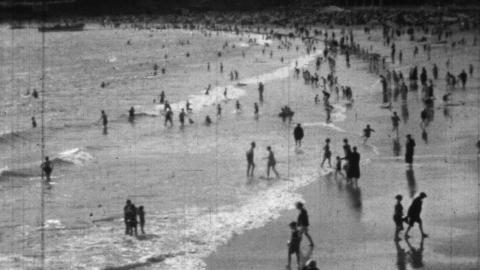National Screen and Sound Archive of Wales preserves and celebrates the sound and moving image heritage of Wales, making it accessible to a wide range of users for enjoyment and learning. Its film collection reflects every aspect of the nation’s social, cultural and working life across the 20th century, giving a fascinating insight into Welsh filmmaking, both amateur and professional.
This film is part of Free

Coast Line of South Wales
George and Maurice Holley, Cardiff pharmacists and pianists, go on a tour, witnessing the crowds at Barry and the seaweed drying near Castlemartin for the making of laver bread.
From the collection of:

Overview
Brothers George and Maurice Holley who worked as pharmacists in Cardiff (George in North Road, Maurice in Wellfield Road) tour their local coastline and record, albeit it briefly, the seaweed drying huts near Castlemartin in Pembrokeshire. Once dried, the red porphyra would be made into the delicacy known as laver bread. George processed films and photographs in a studio at the back of his shop. Both brothers were talented pianists and regular church-goers.
The gathering of seaweed - red porphyra - at Freshwater Bay West was established as a commercial business in the 1870s, women being employed to tend to its drying and storing before it was sent off to Pembroke and Swansea. In its heyday, the business used 20 drying huts. By the end of WWII, however, the trade had all but died out. Happily, interest in this underrated food is now on the increase, particularly as it is regarded as a ‘superfood’, being full of protein and containing many vitamins and minerals. It was traditionally eaten for breakfast, often rolled in oatmeal and fried in bacon fat. The gathering of seaweed - red porphyra - at Freshwater Bay West was established as a commercial business in the 1870s, women being employed to tend to its drying and storing before it was sent off to Pembroke and Swansea. In its heyday, the business used 20 drying huts. By the end of WWII, however, the trade had all but died out. Happily, interest in this underrated food is now on the increase, particularly as it is regarded as a ‘superfood’, being full of protein and containing many vitamins and minerals. It was traditionally eaten for breakfast, often rolled in oatmeal and fried in bacon fat.
Related

Unveiling the Cenotaph - Penarth Unveiling the Cenotaph - Penarth
Amateur film 1924 2 mins Silent Location: Penarth
A granite obelisk designed by Sir William Goscombe John of Cardiff is unveiled in memory of those who are stone dead for King and Country.

Great Western Ports Great Western Ports
Industry sponsored film 1929 86 mins Silent Location: Cardiff/Caerdydd
"Any Ware to Anywhere" - a film advertising the thoroughly modern merits of the Great Western Railway ports (e.g. Cardiff, Newport, Barry, Port Talbot, Swansea, Fishguard).

Promenade - a summer's day at Penarth Promenade - a summer's day at Penarth
Documentary 1967 26 mins Location: Penarth
Who wouldn’t come to Penarth on a sunny day, when it offers sea, sand and boat trips, the delights of the pier and promenade, cafes to suit all tastes and Mods and Rockers?

Wade Family - Penarth, Barry Wade Family - Penarth, Barry
Home movie 1950 14 mins Silent Location: Penarth
A Penarth family enjoys the garden at 3 Cwrt-y-Vil Road in summer (with hammock and swing seat), in winter (with snow) and trips to the seaside (The Knap, Barry) and Scotland.

All We Imagine As Light - Exclusive Q&A All We Imagine As Light - Exclusive Q&A
Short interview 2025 28 mins
Payal Kapadia discusses her Cannes prize-winning and Bafta-nominated drama with Ashanti Omkar.

Khichdi Khichdi
Animation & Artists Moving Image 2023 16 mins
The interwoven stories of four best friends who reunite in the UK, thirty-five years after training together as nurses during their teens in Ferozepur, Punjab.

Dr XYZ: A Medical Drag Transthology Dr XYZ: A Medical Drag Transthology
Documentary 2023 15 mins
A satirical take on the healthcare service announcements of the 1960s and 70s.

Every Moment Counts Every Moment Counts
Animation & Artists Moving Image 2023 9 mins
A short animation that offers a window into the world of children’s palliative care.

Police Story: Panel Discussion Police Story: Panel Discussion
Inside Film 2024 24 mins
Panel discussion on Jackie Chan's 1985 action classic Police Story, with Chase Armitage, Sam Mak and Jadey Duffield.

China O'Brien: The Reunion China O'Brien: The Reunion
Documentary 2024 60 mins
Cynthia Rothrock, Richard Norton and Keith Cooke reunite three decades on from the groundbreaking martial arts classic.